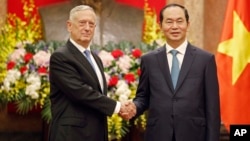Vietnam’s suspension of a popular news website known for hard-hitting stories is the latest move in a burgeoning effort to limit expression that rattles the image-conscious Communist leadership, experts say.
On Monday the head of media under the Ministry of Information and Communication shut down the Tuoi Tre website for three months. The news outlet is known for reports on issues such as corruption.
Tuoi Tre is also a newspaper run by the Ho Chi Minh Communist Youth Union, and was faulted with posting fake news. The site was asked to “correct the false information” and fined $9,500, according to fellow domestic media outlet Viet Nam News.
The site’s suspension follows the June passage of a cyber-security law governing internet use and earlier arrests of bloggers whose writings question the government.
The mass media as a whole should take note, said Murray Hiebert, deputy director of the Southeast Asia Program at the Center for Strategic and International Studies in Washington.
“I think shutting down the Tuoi Tre website was a warning shot across the bow to the paper and other papers to be more cautious,” Hiebert said. “The government has been nervous about the media and bloggers for a few years.”
Wariness of free expression
Since Vietnam’s media, mainstream as well as social, reported a massive coastal fish kill caused by pollution linked to a Taiwanese-owned steel plant two years ago, the government has sought increasingly to control content, Hiebert said.
Vietnamese security officials visited China last year “to discuss ways to better control the internet,” he added. China is known for its tight policing of internet content. Unlike China, Vietnam seldom blocks websites.
A series of arrests of bloggers in 2016 and 2017 showed the Vietnamese government’s sensitivity to public views about graft and inefficiency among officials, experts have said. A blogger who suggested poor government follow-up to the fish die-off received a 10-year prison term last year.
The Ministry of Public Security had proposed the “Law on Cybersecurity” a year ago to give it more power over prohibited content and anti-government activities. It may ultimately require foreign social media to store Vietnamese data locally and remove content quickly if asked, Hiebert said.
After it’s finalized in about half a year, the law might let the government ask internet providers to share information about what ordinary users say online, some fear. The law fueled some of the street demonstrations around the country last month.
“The cybersecurity law definitely raises the ante for people publishing on the net, for sure,” said Frederick Burke, partner with the law firm Baker McKenzie in Ho Chi Minh City. “They’ll have to be more careful.”
Tuoi Tre’s suspension is a first for major media organization in Vietnam, Burke said.
Quest for national unity
Advocacy group Reporters Without Borders said Thursday in response to the news website’s suspension it was “alarmed to see that, after persecuting independent media outlets, the authorities are now targeting those that usually toe the party line.”
Tuoi Tre was suspended for a report quoting Vietnamese President Tran Dai Quang, said Carl Thayer, Southeast Asia-specialized emeritus professor at the University of New South Wales in Australia. He said that report cast the president as “sympathetic” to the country’s anti-China demonstrations in June. The people behind that coverage were accused of “undermining national unity,” Thayer added.
The government takes pride in unifying north and south Vietnam, which were divided until the Communists came to power in the 1970s.
Officials may frown on over-reporting of corruption, said Trung Nguyen, international relations dean at Ho Chi Minh University of Social Sciences and Humanities.
Vietnam has arrested scores of people from its state-run oil firm PetroVietnam over corruption in what analysts call moves to show the public it takes clean government seriously. Ordinary Vietnamese had been calling for cleaner government, which they associate now with police bribery and irregularities in the business permitting process.
At a plenum in May, the party’s Central Committee approved a resolution to review its members more stringently for any graft, Viet Nam News reported at the time.
Officials want the media to reflect trends in society “impartially” but speak for the government and report with a “unifying voice,” Nguyen said.
“I think that the government will try to impose like a full control on the content of the media because, in line with the anti-corruption campaign, some newspapers have been reprimanded for pushing too far,” Nguyen said.








